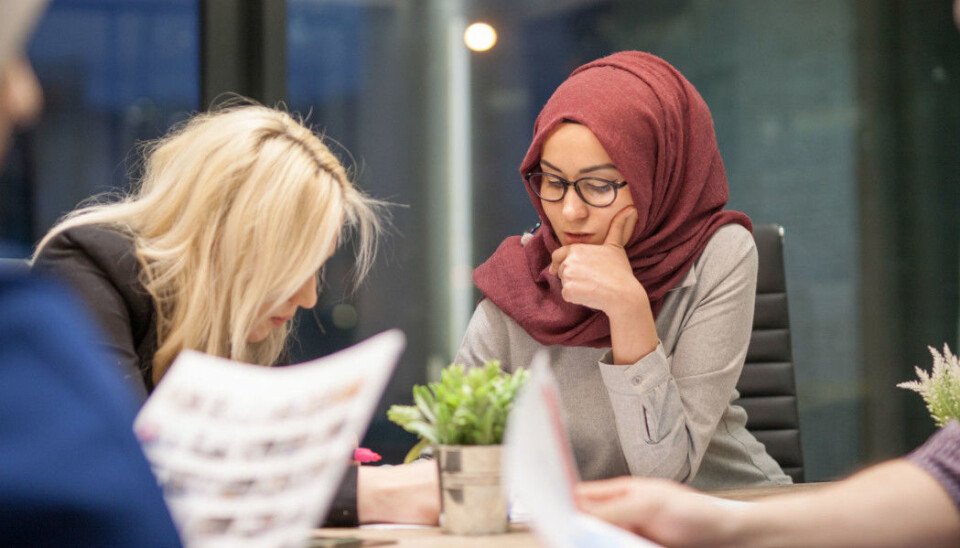
Discrimination: Thirty-five per cent of Muslim immigrants say they did not get a job they were qualified for
Non-religious immigrants experience discrimination in Norway to the same extent as their more religious counterparts. Muslims seeking work are the exception.
Religion is more important for immigrants than for the rest of the Norwegian population, according to a Statistics Norway (SSB) article (in Norwegian) on its website. This is the case whether they are Christians or Muslims, Hindus or Buddhists.
Four out of ten immigrants say religion is very important in their lives. Only four per cent of the members of the Church of Norway (70 per cent of the Norwegian population) indicate the same.
Do religious immigrants feel more discriminated against than other immigrants?
Discrimination in everyday life
To answer this questions, SSB used data from their 2016-survey of the living conditions of immigrants. This survey covered the 12 largest immigrant groups in Norway.
The researchers asked participants if they had experienced differential treatment because they are immigrants.
This does not necessarily mean that they were discriminated against, since people can interpret situations differently. Some may perceive the same action as discriminatory while others may not.
Every fifth participant reported that they experienced discrimination in their everyday life, in places such as public offices, on the street or in shops.
Non-religious and Muslim immigrants appear to be at greatest risk of discrimination.
Muslims experience problems getting jobs
About every fifth immigrant experiences discrimination in the labour market, in school or in the health care system.
Immigrants – both religious and non-religious, but especially Muslims – feel most discriminated against in the context of employment.
More Muslims than others report that they did not get a job they believe they were qualified for because of their immigrant background.
“It’s hard to say how much [discrimination] is due to religion and how much is due to negative attitudes towards the countries that Muslim immigrants come from,” says SSB researcher Anders Barstad.
For example, Norwegian-Iranians are a group that is both largely non-religious and that reports more discrimination.
Non-immigrant-related reasons for not getting a job may also exist.
However, a study published in the Journal of International Migration and Integration found that job seekers with typically Pakistani names are less frequently called in for job interviews than job seekers with Norwegian names.
Immigrants trust the system
The living conditions survey also mapped trust levels. Previous research has shown that immigrants generally have greater confidence in the political system than the rest of the population does.
Immigrants nevertheless seem less inclined than other Norwegians to feel that most people can be trusted. Twenty-two per cent have little trust in others, compared to six percent in the rest of the population.
There is no clear connection between religiosity and trust.
People for whom religion is important have the most trust in law enforcement, the judiciary and politics, and this is especially true of Christians. But many respondents also answered "I don't know" about their confidence in these institutions.
Conversely, people who often attend religious meetings or volunteer in their religious community have a little less confidence in the system. In contrast, active Christians are more trusting towards most people.
Are religious immigrants well integrated?
Barstad wonders if religion may get in the way of integration in Norway, a fairly secular country.
He can't answer this question with the current study, which only measures trust levels, discrimination and participation in voluntary work.
Immigrants volunteer less than others, but those who are actively religious also engage more outside their religious community.
Barstad says the analysis – as far as it goes – mostly suggests that religious immigrants are no less integrated than other immigrants.
References:
Anders Barstad: Er religiøse innvandrere mindre integrert? (Are religious immigrants less integrated?) Statistics Norway analysis 2019/22.
Signe Vrålstad and Kjersti Stabell Wiggen (eds.): Levekår blant innvandrere i Norge 2016 (Living conditions among immigrants in Norway 2016), Statistics Norway report 13/2017.
——-






























